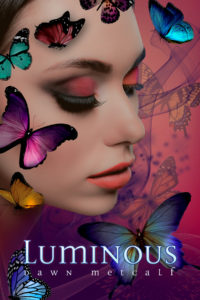Colored Glasses
This morning, I saw a friend waiting with her daughter for the school bus and was able to honk and wave "Hi" as we drove past. I stopped at a crosswalk for a father with his son, helmeted and padded nine ways from Sunday in bright green and white, to let them cross the road. We exchanged a cordial wave and a smile as his son pedaled past. I drove the rest of the way to school with a grin. It's a small thing, and a huge thing, because while I'm always a Pay It Forward kind of gal, I noticed that smiling made the world brighter and the ride smooth and shiny. My son was happy, the incessant favorite song of the day ("Hardware Store" by Weird Al Yankovich*) wasn't getting on my nerves, and we were right on time despite the construction on Main. Now the weather was the same as yesterday, the same construction and backed-up traffic, the same time crunch as school start began, but these little happy changes that occurred first colored the rest and the Big Frustrations of yesterday were No Big Deals today.
Which, of course, brings me back to writing.
It's one thing to have your setting and your world-building securely in place, your character's quirks and motivations fleshing out the initial sketch on paper, but it's just as important--if not more--to include the mental state, the perception, the place-in-mind of the character so we can experience life through his or her emotionally-colored glasses. I can have the same objects and actions in place but describe them very differently, giving a peek into the character who is experiencing them; "long grass tickled by a gentle wind" says something very different than "long grass whipped by an uncaring wind". It might be the same grass, the same breeze, the same moment of the same day, but how the observer feels about life in general (or the wind in specific) colors not only this single description but the rest of the narrative and, by extension, the entirety of the world at that moment which may be bright and beautiful or desolate and dismissive.
Reading Harry Potter with my daughter really underlines that thought for me: watching how eleven-year-old Harry sees the world and the other people at Hogwarts and Privet Drive versus adolescent Harry watching Cho and Hermione, Dudley the Dursleys, Dumbledore, and Sirius with new eyes and short temper. How much did these people change and how much did Harry's POV shift and develop over time? There is more visceral rushing of blood into blushes and furious rages and white-hot, seething, uncaring WTF-ness going on in the heat of hormonal furies and fears. And it changes not only Harry but how we, the reader, experience Harry's world. It's yet another one of those lessons that seem obvious, but are often forgotten: while we know characters must change from the beginning of the book through to the end of the book, does the world (through their perspective) change with them or does it remain static? It's something I'm planning on wielding as I attack my WIP.
*wave *smile* Go Write Now!
* Lego-version of said song found here. And if that's not worth a smile, I don't know what is!


